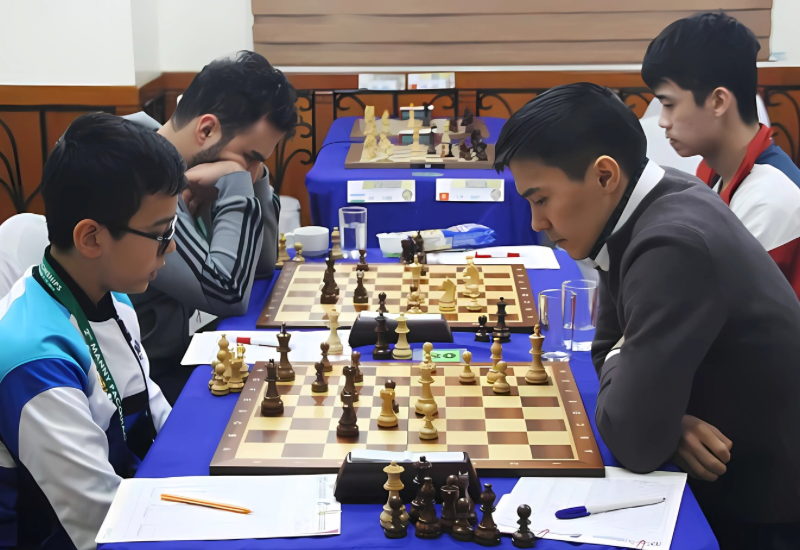In chess tournaments, the scoring system serves as the framework for ranking players based on their performance. A well-defined scoring system is essential for determining winners, rankings, and players’ overall progress fairly and consistently. Points earned in each game contribute to a player’s overall standing in the tournament, impacting their rating, ranking, and sometimes even qualifying them for other tournaments.
Why Does The Chess Tournament Scoring System Matter?
Imagine two players finishing a game. Both walk away with different results, but each contributes to their ranking in a way that affects the entire tournament. The chess tournament point system ensures that each game has a concrete impact, so that every move, every win, and every draw plays into the overall competition.
What is The Traditional Chess Scoring and Point System in Tournaments?
The most widely used system in chess tournaments is the traditional chess tournament scoring method, which is straightforward and logical.
- 1 Point for a Win
Winning a game earns the player 1 full point, the maximum available per game. It signifies a clear victory over an opponent and provides the greatest boost in tournament standings.
- ½ Point for a Draw
If the game ends in a draw, each player receives ½ point. Draws are common at advanced levels where players are closely matched, and this scoring reflects an equal division of points.
- 0 Points for a Loss
Naturally, a player earns no points for a loss. This result is a critical part of the competitive framework, encouraging players to aim for at least a draw to avoid falling behind in the standings.
- Logical and Standardized Nature of Traditional Scoring
This 1-½-0 system is widely accepted in chess because it’s simple, logical, and leaves no room for ambiguity. It offers a straightforward way to rank players while incentivizing winning over settling for draws.
What are Score Notations in Chess Tournament?

Chess scores aren’t only about the points – they’re often presented in standardized notations that help track each player’s performance in a tournament. Some examples of chess notations are A−B, +W−L=D, and +A or −A notations.
- Understanding A/B, A−B Notations
In some scoreboards, you may see the score represented as A/B or A−B, where “A” stands for the player’s current points, and “B” represents the total number of games played. This format gives an at-a-glance view of performance consistency.
- Interpreting +W −L =D Format
Another common format is +W −L =D, where “+” indicates wins, “−” signifies losses, and “=” represents draws. For instance, a record of +4 −1 =3 shows that a player has four wins, one loss, and three draws.
- Utilizing +A or −A for Win-Loss Calculations
Additionally, some tournaments use +A or −A, where “A” represents the points accumulated or deducted based on wins or losses. For instance, a +3 rating might mean a player gained three points after several rounds.
Alternative Chess Tournament Scoring & Point Systems
While the traditional chess tournament point system is widely accepted, some tournaments introduce alternative scoring methods to encourage different styles of play and strategic approaches.
1. Three Points for a Win System (3-1-0)
In the 3-1-0 system, players earn three points for a win, one point for a draw, and zero points for a loss. This scoring method is used in certain tournaments to encourage players to aim for wins rather than settling for draws, adding an extra layer of excitement and strategic planning to the game.
2. Impact on Player Strategy and Rankings
By awarding three points for a win, the 3-1-0 system discourages players from playing for draws, leading to more aggressive and decisive games. Players are more likely to take calculated risks, resulting in a livelier tournament experience.
3. Comparison and Potential Issues, Such as Collusion
Despite its benefits, the 3-1-0 system can lead to issues such as collusion, where players may intentionally try to secure draws in certain situations. It also places a lot of weight on wins, which can sometimes overshadow strong performances in drawn matches.
Advanced Chess Tournament Scoring Examples
Alternative chess tournament scoring systems go beyond the basics to address specific goals, such as reducing the frequency of draws or creating more engaging gameplay.
1. Draws Not Counted System
In this system, only wins are counted toward tournament standings. Draws have no impact, and each player receives zero points. This chess tournament scoring method is sometimes used in rapid or blitz tournaments where the emphasis is on decisive outcomes rather than lengthy battles.
2. Description of Ballard Antidraw Point System (BAPS)
The Ballard Antidraw Point System (BAPS) aims to reduce draws in chess tournaments. Under BAPS, players receive a lower score for a draw compared to a win, even if the game’s result would typically warrant a ½ point each. BAPS is an experimental system, and while it has shown promising results in making games more decisive, it’s not without controversy.
3. Impact and Challenges of Alternative Systems
While alternative scoring methods can add excitement and reduce draw rates, they also have challenges. Systems like BAPS may create confusion among players unfamiliar with these rules and lead to imbalanced rankings if not applied correctly.
Connection to Rating Systems

A player’s performance in tournaments doesn’t only affect their tournament standing – it also plays a significant role in their chess rating.
1. What is The Influence of Scoring on Player Ratings?
A player’s rating, such as their ELO, is influenced by wins, losses, and draws in official tournaments. Scoring systems that reward wins more heavily or discourage draws can have a marked impact on rating calculations, sometimes leading to faster rating changes.
2. How Chess Tournament Scoring Affects Long-Term Player Performance Evaluation?
Different scoring systems can alter long-term evaluations of player strength. For example, players who excel in high-risk, high-reward environments may benefit more from a 3-1-0 scoring system than those who prefer safer, methodical gameplay. As such, the scoring system used can impact a player’s strategic development over time.
Bringing it All Together: Chess Scoring Systems and Competitive Success
Chess tournament scoring systems are essential frameworks that shape the competitive landscape, influencing players’ strategies, ratings, and the outcomes of games. From the traditional 1-½-0 system to innovative alternatives like BAPS, each scoring method brings unique dynamics to the game.
As chess continues to evolve, so too will the ways in which we measure and reward performance. The scoring system in a tournament isn’t just about points – it’s about cultivating a thrilling and fair competition that challenges players to bring out their best.
Ready to elevate your tournament play and master chess tournament scoring systems? Caissa School of Chess offers a comprehensive curriculum to take your game to the next level. With Live classes from world-renowned GM coaches who’ve trained prodigies like Gukesh, Arjun, Raunak, and Nihal, you’ll engage in peer-to-peer learning, benefit from supplementary classes, and practice in structured tournaments to fully prepare for competitive success. Check now!






